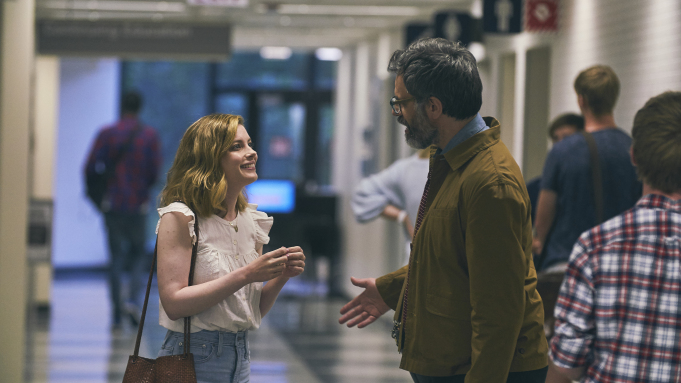Ah, college, when dreams were just within reach and pursuing your passions wasn’t a death sentence (unless you count tuition costs). If you miss those days, you’re not alone: Kate Conklin, struggling author and protagonist of I Used to Go Here, feels like her best memories were back on campus. After her book tour falls through due to low sales, a professor from her past invites her to speak at her alma mater, and Kate seizes the opportunity like it were a lifejacket. It’s a sad reality to peak in college, but hey—at least it’s not peaking in high school.
When Kate (Gillian Jacobs) arrives in her college town of Carbondale, Illinois, what follows is about as low-key as you’d expect out of a stint in not-Chicago. She reunites with ol’ Professor Kirkpatrick (Jemaine Clement), meets the new crop of creative writers, stops by her old house, runs into an acquaintance that got hot—the usual. At one point, she describes her book to a pair of friends at a bar: “the whole thing is very restrained, but people don’t usually want that. They want something dramatic and exciting and bold, but I don’t think that life is bold like it is in the stories; I think real life is just very restrained.”
If that sounds like a director declaring her stylistic intentions out loud, that’s because I just told you it is. I Used to Go Here’s writer/director Kris Rey is no stranger to downbeat mumblecore, and to no one’s surprise, she directs like her protagonist writes—albeit with maybe a little too much restraint. The movie is boring to look at: scene after scene of visually interchangeable conversations cut together at a metronome pace. Even during a party scene, the camera bobs along listlessly like a beach ball in the water. Combine this homogeneity with a near-absent score and the long, awkward silences of ill-fitting cringe comedy, and the results are disappointingly inert. The handheld looseness of other naturalistic efforts feels like sweet release compared to this.
It’s not a wash, by any means: Gillian Jacobs proves herself a perfect fit for this relaxed, modest tone; there are some genuine laughs to be had; and the second half is a marked improvement over what preceded it. The first half, having established early and clearly that Kate isn’t a fulfilled writer, wastes its time as a will they/won’t they between Kate and whatever handsome man she happens to wander into—there are four potential romantic interests by the halfway mark, and at least two of them feel entirely extraneous, adding little but extra layers of ennui. The second half, on the other hand, gives the film more shape, especially when Kate starts vocalizing the despair that hung around the first half like a dying elephant in the room. Her fears sound like our fears, and they hit close to home. It may not be a life-affirming experience, but it’s sincerely life-acknowledging, and that alone can be more than enough.
★★★ (3/5)




